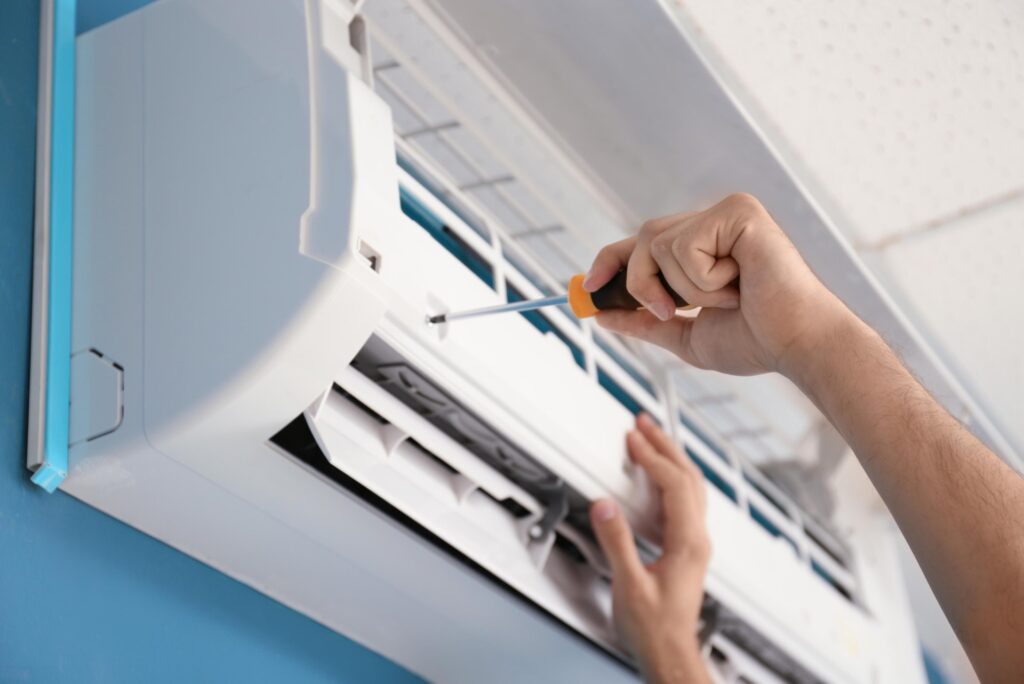How to Tell If Your AC Needs Repair or Replacement: A Cost-Benefit Breakdown
Call Us Anytime!
Need AC Repairs or a New Unit?
Your air conditioner plays a crucial role in keeping your home cool and comfortable, especially during the hottest months of the year. However, like all appliances, your AC won’t last forever. At some point, you’ll be faced with a decision: should you repair your AC unit or replace it entirely?
This decision isn’t always straightforward. While repairs may seem like the cheaper option upfront, frequent breakdowns or high energy bills could indicate that replacement is the more cost-effective choice in the long run. In this guide, we’ll break down the factors to consider when deciding between AC repair and replacement, helping you make the best choice for your home and budget.




Key Factors to Consider Before Deciding
Before committing to either a AC repair or a full replacement, it’s essential to evaluate several factors. These considerations will help you determine whether your current system still has life left in it or if it’s time to invest in a newer, more efficient model.
Age of the AC Unit
The age of your AC system is one of the biggest indicators of whether repair or replacement is the right choice.
- Less than 10 years old → Repair is usually the best option if the unit is well-maintained.
- 10–15 years old → Repairs might still be viable, but efficiency loss and increased wear could make replacement worth considering.
- 15+ years old → Most AC units have a lifespan of 15–20 years. If yours is nearing or past this range, replacement is typically the better investment.
Frequency and Cost of AC Repairs
If your AC requires frequent service calls, the costs can quickly add up. Consider this general rule of thumb:
- If the cost of repair is more than 50% of the price of a new unit, replacement is the better option.
- If repairs are infrequent and minor, fixing the existing system makes more sense.
Energy Efficiency and Operating Costs
Older AC units tend to be less energy-efficient, leading to higher energy bills. Upgrading to a newer system with a high SEER (Seasonal Energy Efficiency Ratio) rating can save you money over time.
Compare your monthly energy costs with an estimated new AC unit’s efficiency rating to see if replacement makes financial sense.
Performance and Comfort Levels
Are you experiencing uneven cooling, weak airflow, or high humidity levels? If your AC isn’t maintaining comfortable temperatures despite repairs, it may be struggling to function efficiently.
When to Repair Your AC
If your AC is still relatively new and the cost is manageable, opting for AC repairs can extend its lifespan without a significant financial burden. Here are some situations where repair is the better choice:
Minor Issues That Can Be Fixed Easily
Some AC problems are simple and inexpensive to fix, making repair the best option. These include:




Warranty Coverage Still Applies
If your unit is under warranty, AC repairs may be covered at little or no cost to you. Check with the manufacturer or your HVAC provider to see if your warranty is still valid.
Recent AC Installation or Major Repairs
If you’ve recently installed your AC unit or invested in a significant repair (like a new compressor or coil), it’s usually more cost-effective to continue maintaining the system rather than replacing it prematurely.
When to Replace Your AC
At a certain point, replacing your air conditioner makes more financial and practical sense. Here’s when you should strongly consider upgrading to a new system:
Your AC is 15+ Years Old
Older AC units are less efficient and more prone to breakdowns. If your system is 15 years or older, investing in a replacement can save you money in the long run on energy bills and repairs.
AC Repair Costs Are Getting Too High
If you’ve already spent thousands on repairs over the past few years, investing in a new unit with a warranty may be the better long-term decision.
Use the “5,000 Rule” to decide:
Multiply your AC’s age by the cost of repairs.
- If the total is less than 5,000, repair it.
- If it’s more than 5,000, replacement is a better choice.
For example:
- 12-year-old AC × $500 repair = 6,000 → Consider replacement.
- 6-year-old AC × $400 repair = 2,400 → Repair makes sense.
Rising Energy Bills Due to Poor Efficiency
Aging AC units lose efficiency over time, consuming more power to produce the same cooling effect. If your energy bills keep climbing despite no change in usage, your AC may be inefficient.
New models with higher SEER ratings (16+ SEER) can reduce cooling costs by 20–40% compared to older systems.
Inconsistent Cooling or Humidity Problems
If your AC struggles to maintain even temperatures or has trouble controlling humidity, it may be failing internally. A new system can provide consistent cooling, better humidity control, and improved air quality.
You’re Using an Outdated Refrigerant (R-22/Freon)
Older AC systems use R-22 refrigerant, which has been phased out due to environmental concerns. If your AC requires an R-22 recharge, replacement is the better choice, as the refrigerant is increasingly expensive and difficult to find.
Benefits of Upgrading to a New AC System
If you decide to replace your AC, here are some advantages:






Making the Best Decision for Your Home
So, should you repair or replace your AC? Here’s a quick summary to help you decide:
Factor | Repair | Replace |
Age | Under 10 years | Over 15 years |
Repair Costs | Less than 50% of replacement | More than 50% of replacement |
Energy Efficiency | Still relatively efficient | Rising energy bills |
Frequency of Repairs | Rare | Frequent breakdowns |
Cooling Performance | Still effective | Struggles to cool home |
Refrigerant Type | Uses R-410A | Uses outdated R-22 |
If two or more replacement factors apply to your AC, it’s time to consider a new system.
The Environmental Impact of Keeping an Outdated AC System
When deciding whether to repair or replace your AC, it’s important to consider the environmental impact. Older air conditioning units consume more energy and often use outdated refrigerants that contribute to global warming. Upgrading to a modern system can reduce your carbon footprint while saving you money on energy costs.
How an Older AC Harms the Environment:
- Higher Energy Consumption: Older AC units require more electricity to cool the same space compared to newer, energy-efficient models. This increased demand contributes to higher greenhouse gas emissions from power plants.
- Use of Outdated Refrigerants: Many old AC systems use R-22 (Freon), which has been phased out due to its ozone-depleting properties. If your system still runs on R-22, replacing it with an energy-efficient unit that uses R-410A or other eco-friendly refrigerants is the responsible choice.
- Increased Waste and Landfill Impact: Frequent AC repairs mean more discarded parts over time. A failing system that constantly needs fixes is less sustainable than investing in a long-lasting, high-efficiency unit.
Benefits of an Energy-Efficient AC System:



If you want to make an environmentally responsible choice, replacing an outdated AC system with a modern, high-efficiency unit is the best way to go.
Financing and Incentives for AC Replacement
A major concern for homeowners considering AC replacement is the initial cost. While a new unit is a significant investment, there are multiple financing options and incentive programs available to help make replacement more affordable.
Financing Options:
- HVAC Financing Plans – Many HVAC companies offer low-interest financing options that allow homeowners to pay for a new system in manageable monthly installments.
- Home Equity Loans – If you have home equity available, you may qualify for a loan with low interest rates to cover the cost of a new AC.
- Credit Card Promotions – Some homeowners opt for zero-interest credit card promotions, allowing them to pay off the cost of a new system without additional fees.
Available Incentives & Rebates:
- Federal Tax Credits – The U.S. government provides tax incentives for purchasing high-efficiency HVAC systems.
- State & Local Rebates – Check with your local utility company for rebates or discounts on ENERGY STAR-rated AC units.
- Manufacturer Rebates – Many AC manufacturers offer seasonal discounts and cashback promotions.
By exploring financing and incentive options, you can make upgrading your AC system more affordable while benefiting from long-term energy savings.
Invest Wisely for Comfort & Savings
Your air conditioner is a long-term investment, and making the right choice between repairing or replacing ensures you get the most value for your money. If your AC is relatively new and experiencing a minor issue, an AC repair is often the best option. However, if your system is aging, inefficient, or frequently breaking down, replacement can save you money in the long run.
Still unsure? Consult a professional HVAC technician, like Anytime A/C, for an expert assessment. They can provide an honest evaluation of your system and recommend the best course of action based on your home’s cooling needs and budget. If you’re ready to stay cool, reach out to Anytime A/C today and schedule your free onsite estimate.

